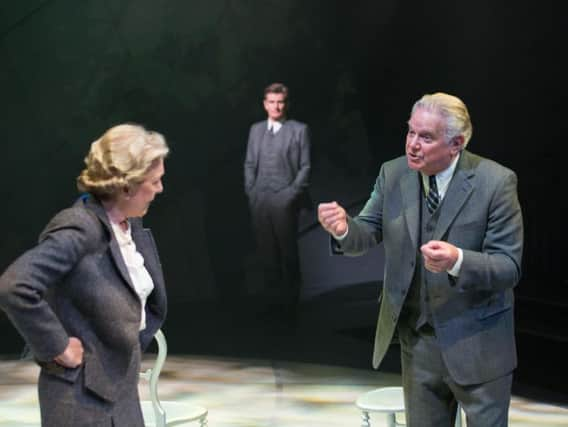Minerva play "not so much about physics as the fragility of the human condition"


But really what happens in Copenhagen by Michael Frayn is much more about the “fragility of the human condition and the inscrutability of the human condition”.
The play, which sees Charles share the stage with Patricia Hodge and Paul Jesson, runs in Chichester’s Minerva Theatre until September 22.
Advertisement
Hide AdAdvertisement
Hide AdIn 1941, in the middle of the Second World War, the great German physicist Werner Heisenberg (Charles) made a strange trip to Copenhagen to see his Danish colleague Niels Bohr. They were old friends and collaborators, and together in the 1920s they had begun to lay bare the mysteries at the heart of the atom. But now Denmark was under German occupation, the meeting was fraught with danger and embarrassment – and Heisenberg was burdened with a terrible secret.
Why he went to Copenhagen and what he wanted to say to Bohr are questions which have exercised historians ever since. The play teases out some answers.
“What I love in the play is the brilliance of the conjunction in Frayn’s play between physics and the human condition,” Charles says. “I had worked with the director Michael Blakemore before, and he had always said what a great play Copenhagen was. We had talked about doing it for maybe three or four years ago. I just love the way he delivers it, with physics as the backbone to something wider.
“My character Heisenberg goes so see Bohr. He was my character’s mentor, and Heisenberg was working towards the first atomic bomb which obviously didn’t happen. Germany didn’t have the atomic bomb. If it had done, things would have been considerably different… but they were working towards it and it didn’t happen and this play looks at why. It is all fully factual. It is a meeting that did actually take place between two people, and it was a private meeting so there is nobody else to say what happened, but the two of them give conflicting versions of what was said. There has always been this great mystery, about this mystery that potentially changed the course of the war.
Advertisement
Hide AdAdvertisement
Hide Ad“It is a play about why we make decisions, why we decide to do one thing rather than another. It is a play about the fragility and the inscrutability of the human condition and the two are beautifully married with the physics. I gave up chemistry O level so that I could concentrate on biology and physics, and I still got a U in both. But the principles of physics as explained here by Frayn are beautifully simple. It is just all the rest of physics which is completely unfathomable to people like me. But here the physics of the atom bomb are absolutely perfectly illustrated by Frayn in the play.
“In the play Patricia is… well, she is not the mediator. But she is not the devil’s advocate either. She is Bohr’s wife, and she represents a voice of suspicion. She is wary of Heisenberg’s motives, and really that covers history. Some people see Heisenberg as a Nazi bomb builder. Some people would say that he actually had a moral compass. Patricia’s character represents the suspicions towards him. It is all exactly the kind of play that I like. It is a provocative play that will leave you asking your own questions about humanity. It is an intimate play, a conversational play but also clever and fast and funny, and you find yourself getting swept along by it, the exhilaration of the arguments…”
Advertisement
Hide AdAdvertisement
Hide Ad